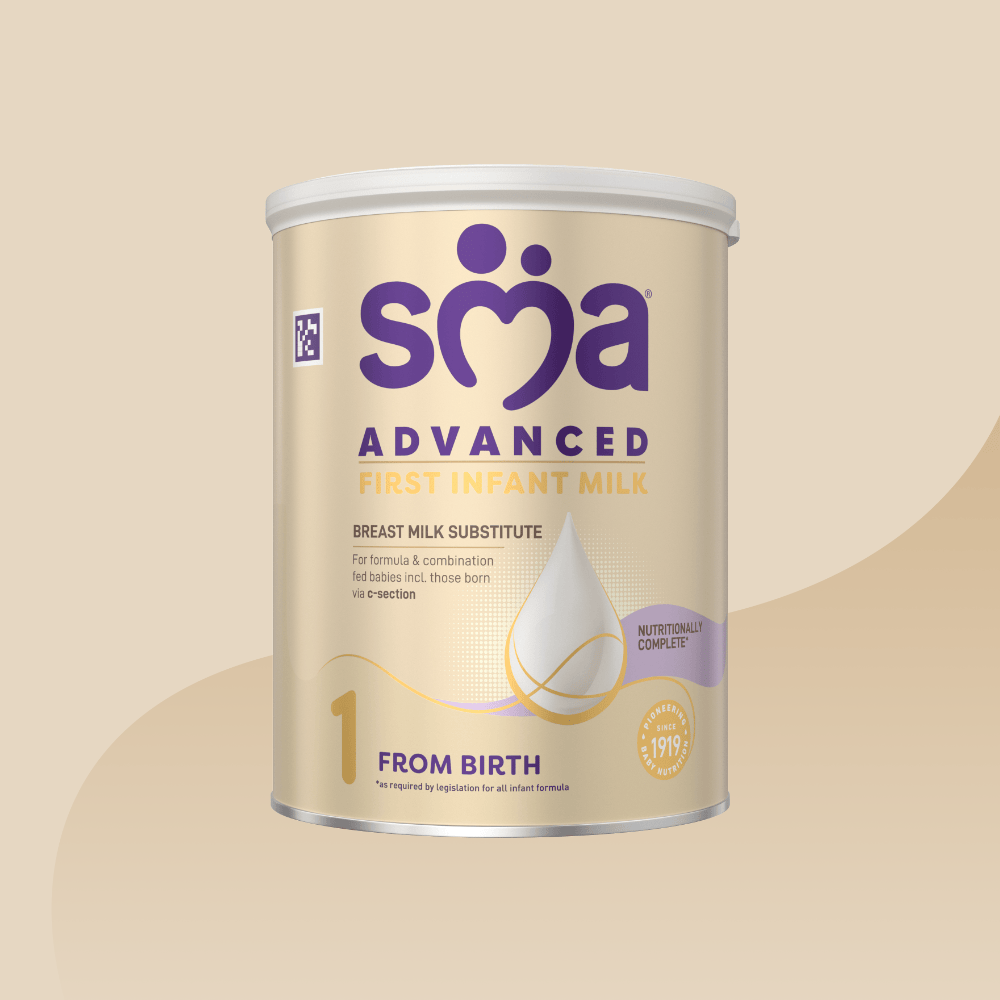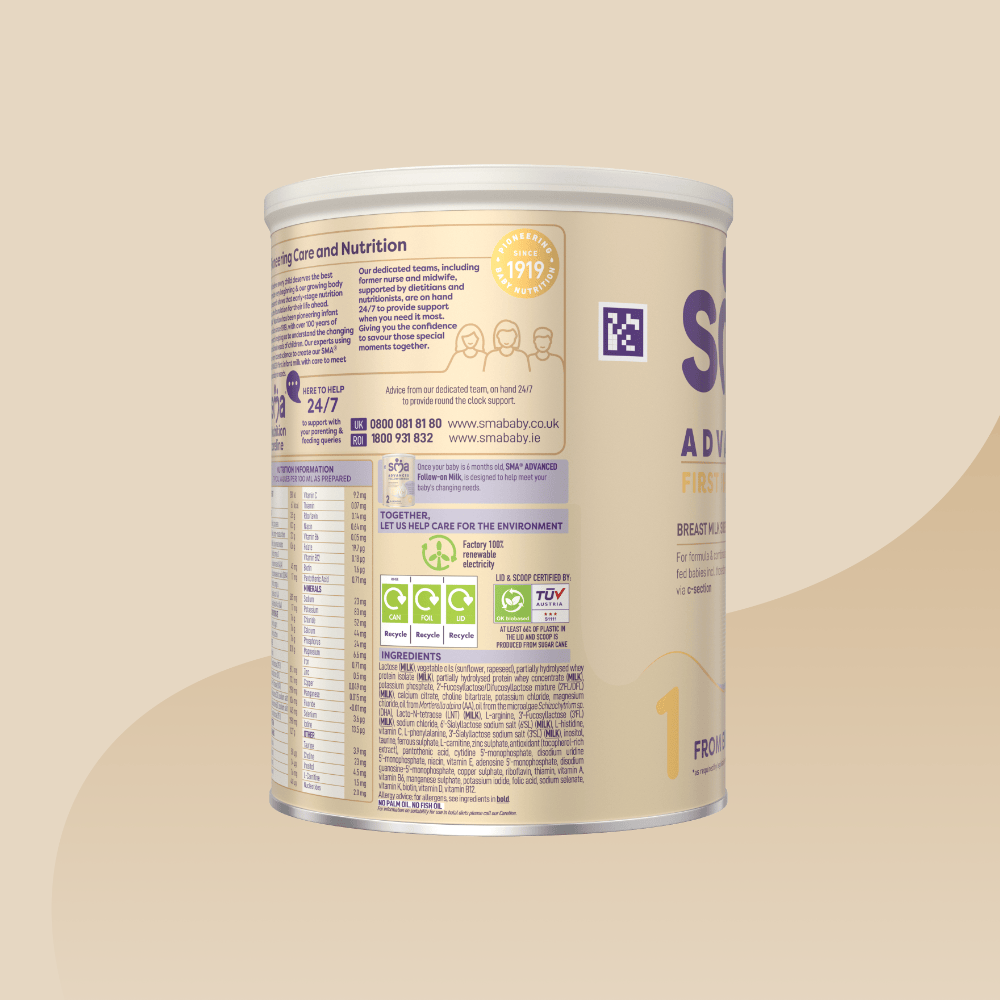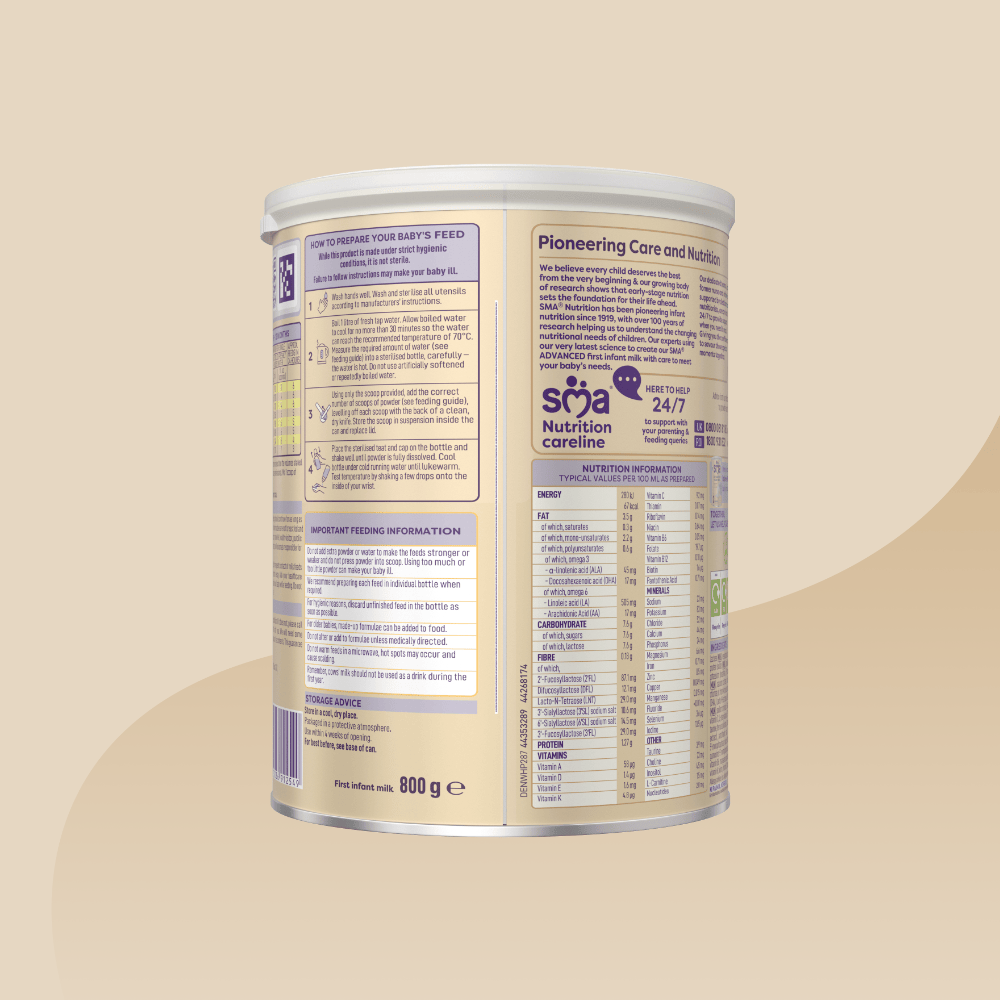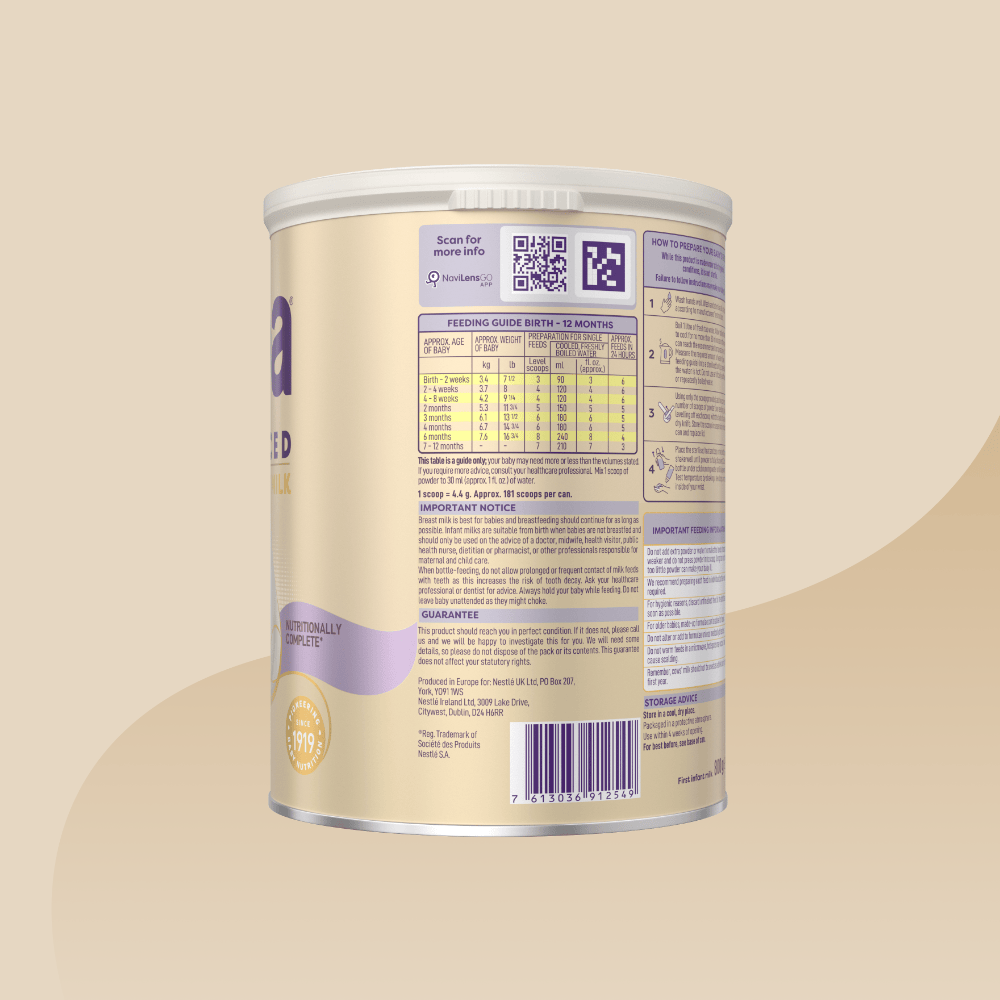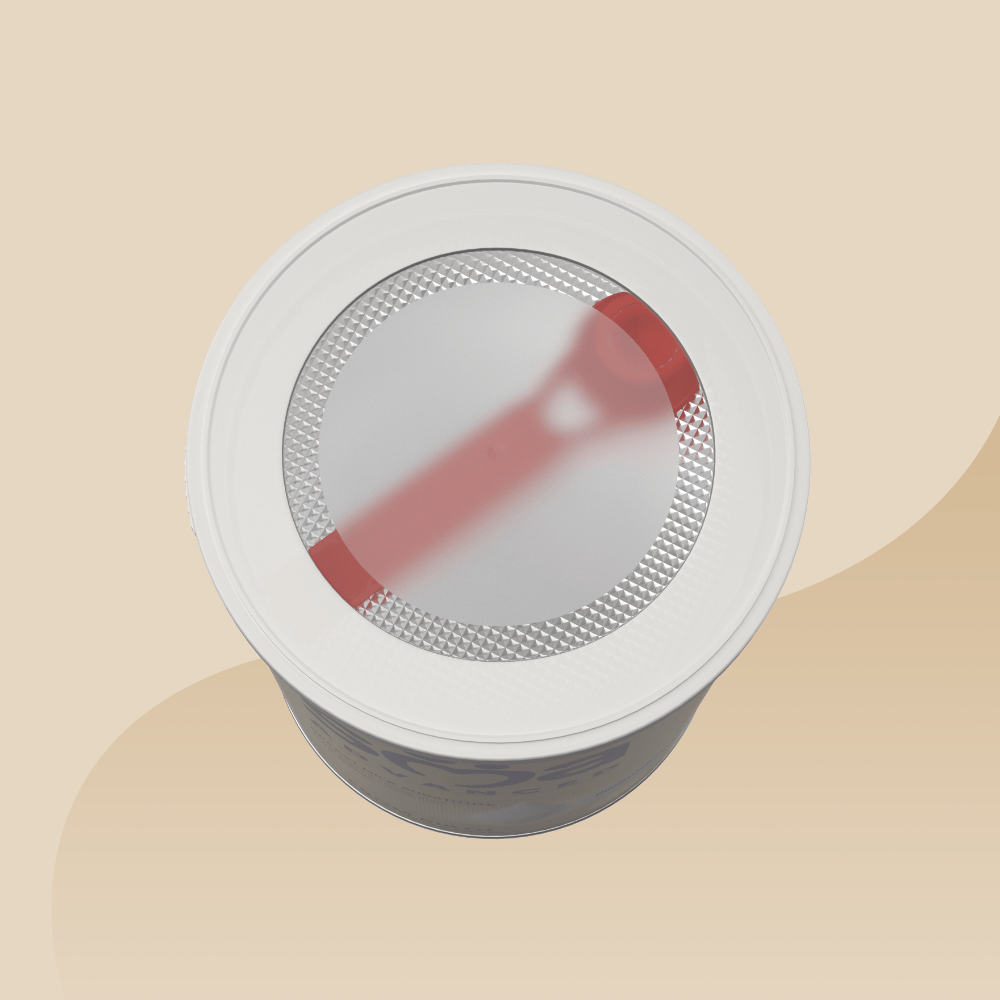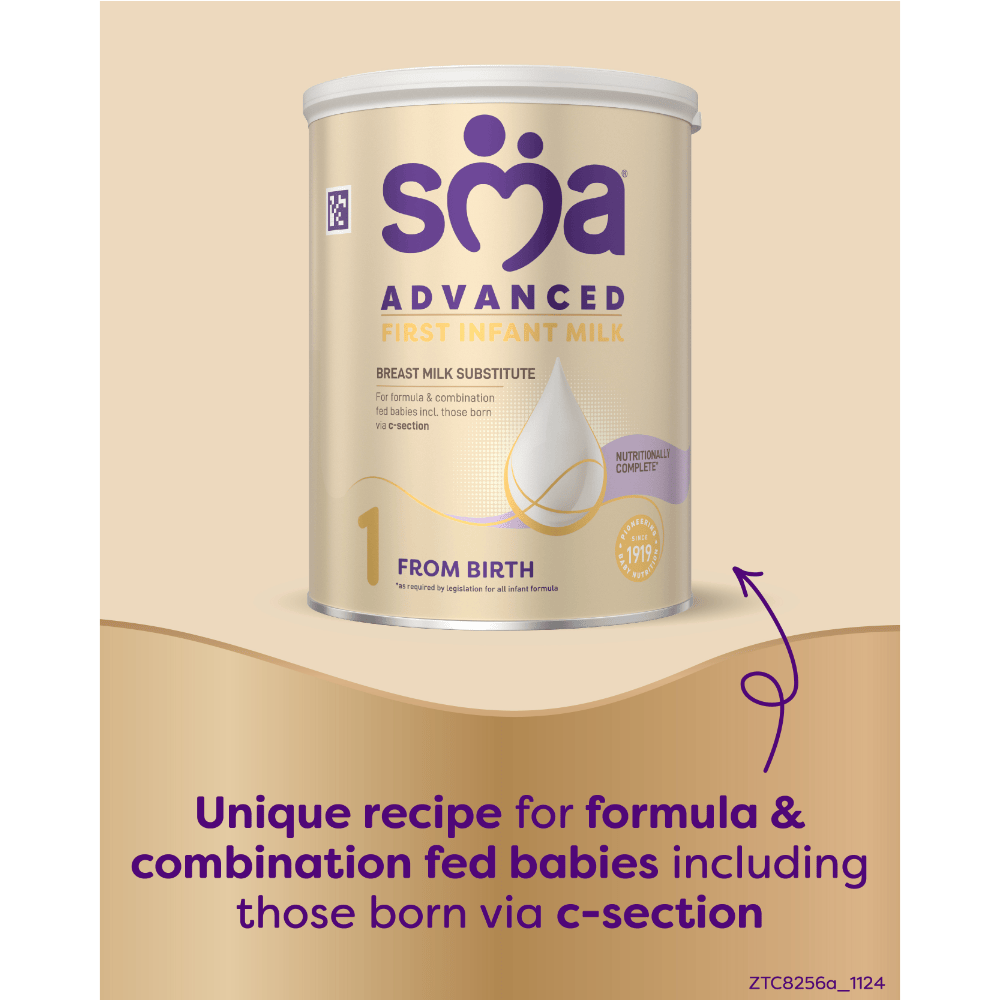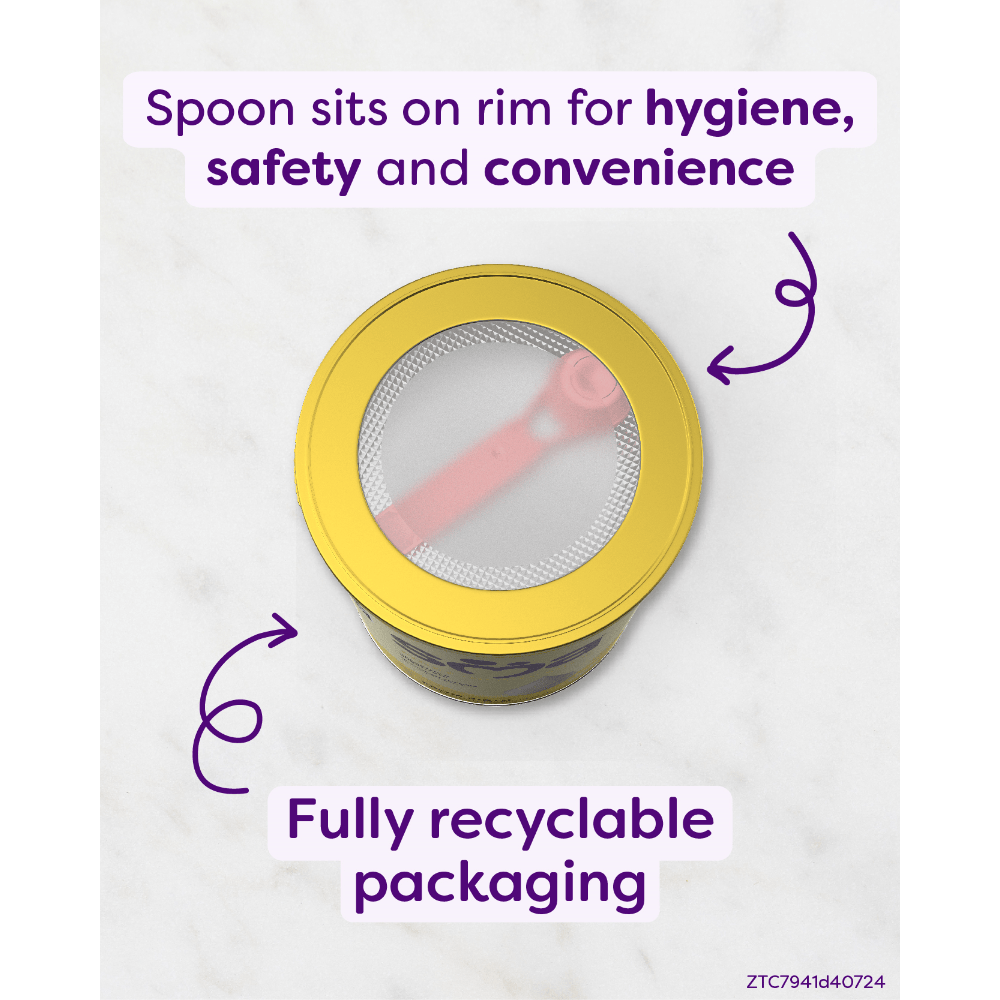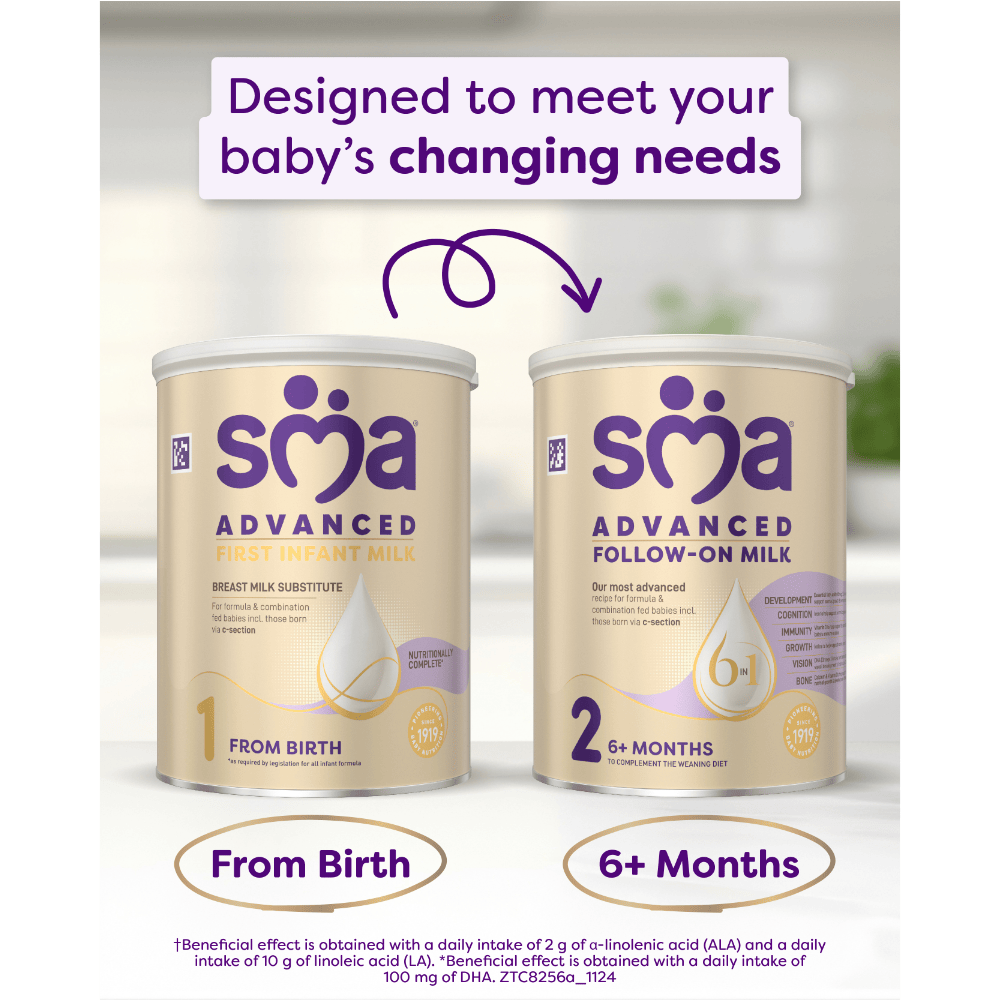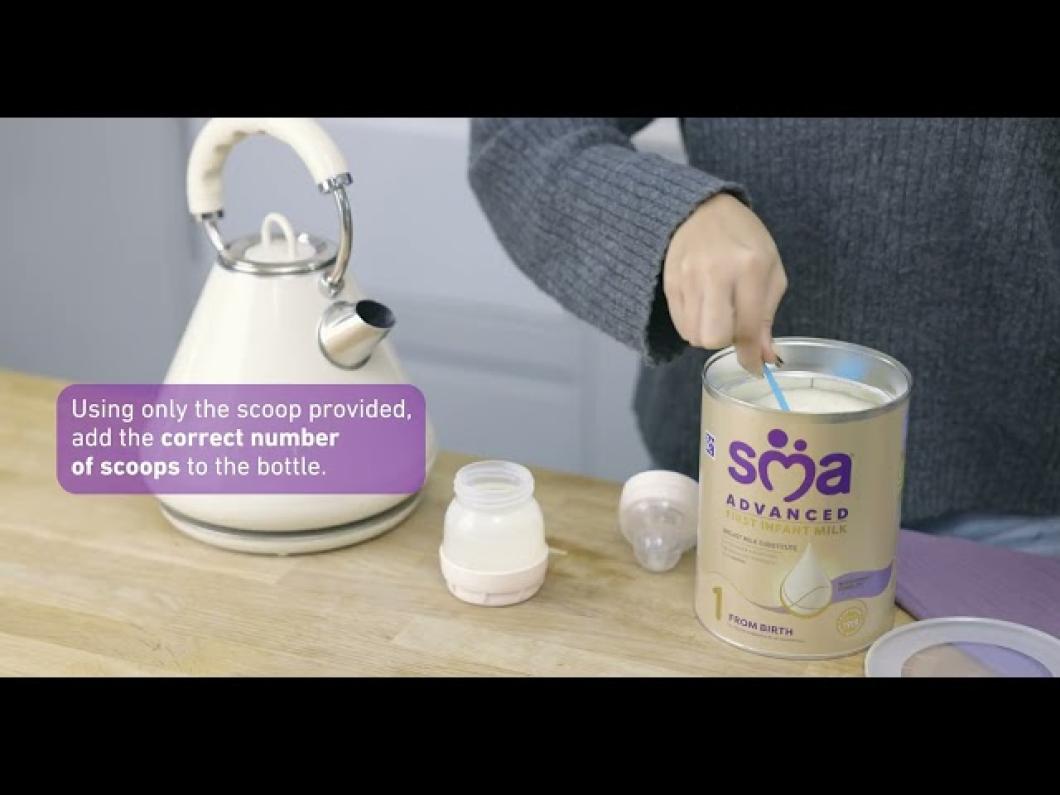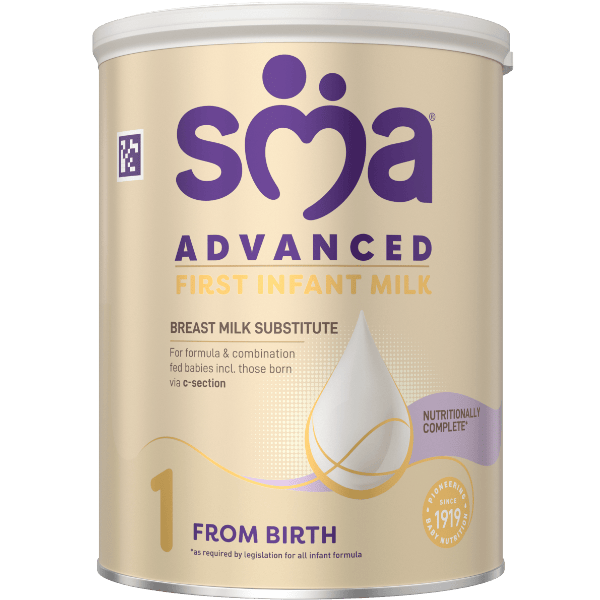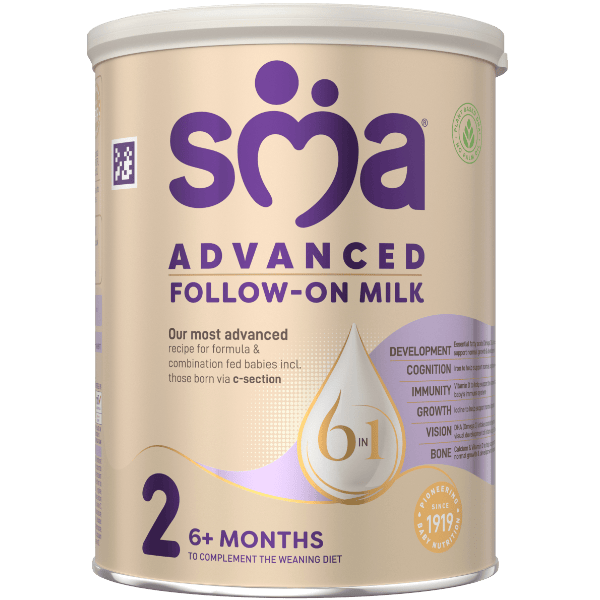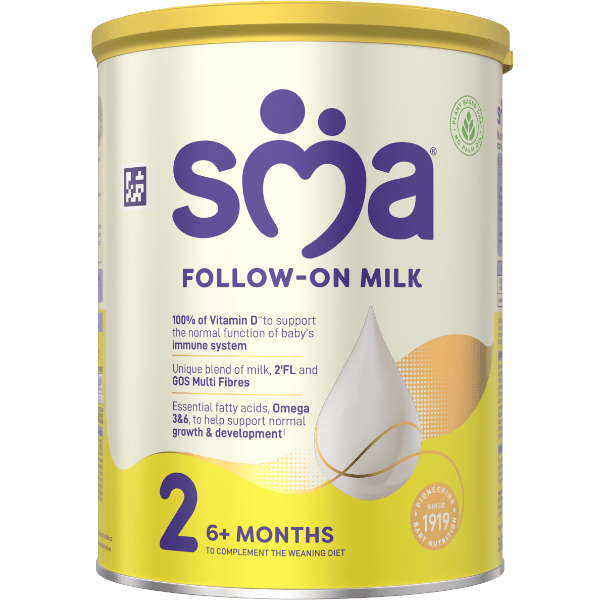SMA® ADVANCED First Infant Milk Powder
Stage 1 From birth. Breastmilk substitute. For formula fed and combination fed babies, including those born via C-section.
Why SMA® ADVANCED First Infant Baby Milk?
SMA® Nutrition has been pioneering infant nutrition since 1919, with over 100 years of research helping us to understand the changing nutritional needs of children. Our experts using our very latest science to create our SMA® ADVANCED first infant milk with care to meet your baby’s needs.
Pioneering Care and Nutrition
Our dedicated careline team – supported by dietitians and nutritionists – are on hand 24/7 to provide support when you need it most, giving you the confidence to savour those special moments together.
*as required by legislation for all infant formula
How to prepare your baby’s feed
Watch our preparation video for the safe way to make SMA® ADVANCED First Infant powder formula milk or follow the step-by-step instructions below.
And here is how you prepare it step by step
While this product is made under strict hygienic conditions, it is not sterile. Failure to follow instructions may make your baby ill.
Sustainability
Caring for babies also means caring for the world they will inherit from us!

Steel can, foil and protective lid recyclable.

At least 66% of plastic in the lid and scoop is produced from sugar cane

Factory 100% renewable electricity
Together, let us help care for the environment
SMA® ADVANCED First Infant Baby Milk Powder Formula
800g Powder
Easy open lid. Scoop can be stored in suspension inside the can. Use product within 4 weeks of opening. Approximately 181 scoops per can
Lactose (MILK), vegetable oils (sunflower, rapeseed), partially hydrolysed whey protein isolate (MILK), partially hydrolysed protein whey concentrate (MILK), potassium phosphate, 2'-Fucosyllactose/Difucosyllactose mixture (2'FL/DFL) (MILK), calcium citrate, choline bitartrate, potassium chloride, magnesium chloride, oil from Mortierella alpina (AA), oil from the microalgae Schizochytrium sp. (DHA), Lacto-N-tetraose (LNT) (MILK), L-arginine, 3'-Fucosyllactose (3'FL) (MILK) , sodium chloride, 6'-Sialyllactose sodium salt (6'SL) (MILK), L-histidine, vitamin C, L-phenylalanine, 3'-Sialyllactose sodium salt (3'SL) (MILK), inositol, taurine, ferrous sulphate, L-carnitine, zinc sulphate, antioxidant (tocopherol-rich extract), pantothenic acid, cytidine 5'-monophosphate, disodium uridine 5'-monophosphate, niacin, vitamin E, adenosine 5'-monophosphate, disodium guanosine-5’-monophosphate, copper sulphate, riboflavin, thiamin, vitamin A, vitamin B6, manganese sulphate, potassium iodide, folic acid, sodium selenate, vitamin K, biotin, vitamin D, vitamin B12.
Allergy advice: for allergens, see ingredients in bold.
NO PALM OIL. NO FISH OIL.
For information on suitability for use in halal diets please call our Careline.
| Nutritional information per 100 ml prepared feed | ||||
|---|---|---|---|---|
| Nutritional information | ||||
| Typical values | ||||
| Energy | 280 kJ 67 kcal | |||
| Fat | 3.5 g | |||
| of which, saturates | 0.3 g | |||
| of which, mono-unsaturates | 2.2 g | |||
| of which, polyunsaturates | 0.6 g | |||
| of which, Omega 3 | ||||
| α-linolenic acid (ALA) | 45 mg | |||
| Docosahexaenoic Acid (DHA) | 17 mg | |||
| of which, Omega 6 | ||||
| Linoleic Acid (LA) | 505 mg | |||
| Arachidonic Acid (AA) | 17 mg | |||
| Carbohydrate | 7.6 g | |||
| of which, sugars | 7.6 g | |||
| of which, lactose | 7.6 g | |||
| Fibre | 0.18 g | |||
| of which: | ||||
| 2’-Fucosyllactose (2’FL) | 87.1 mg | |||
| Difucosyllactose (DFL) | 12.1 mg | |||
| Lacto-N-Tetraose (LNT) | 29 mg | |||
| 3’-Sialyllactose (3’SL) sodium salt | 10.6 mg | |||
| 6’-Sialyllactose (6’SL) sodium salt | 14.5 mg | |||
| 3'-Fucosyllactose (3'FL) | 24 mg | |||
| Protein | 1.27 g | |||
| Nutritional information per 100 ml prepared feed | ||||
|---|---|---|---|---|
| Vitamins | ||||
| Typical values | ||||
| Vitamins | ||||
| Vitamin A | 58 µg | |||
| Vitamin D | 1.4 µg | |||
| Vitamin E | 1.6 mg | |||
| Vitamin K | 4.8 µg | |||
| Vitamin C | 9.2 mg | |||
| Thiamin | 0.07 mg | |||
| Riboflavin | 0.14 mg | |||
| Niacin | 0.64 mg | |||
| Vitamin B6 | 0.05 mg | |||
| Folate | 19.7 µg | |||
| Vitamin B12 | 0.18 µg | |||
| Biotin | 1.6 µg | |||
| Pantothenic Acid | 0.71 mg | |||
| Nutritional information per 100 ml prepared feed | ||||
|---|---|---|---|---|
| Minerals | ||||
| Typical values | ||||
| Minerals | ||||
| Sodium | 23 mg | |||
| Potassium | 83 mg | |||
| Chloride | 52 mg | |||
| Calcium | 44 mg | |||
| Phosphorus | 24 mg | |||
| Magnesium | 6.6 mg | |||
| Iron | 0.71 mg | |||
| Zinc | 0.5 mg | |||
| Copper | 0.049 mg | |||
| Manganese | 0.015 mg | |||
| Fluoride | <0.01 mg | |||
| Selenium | 3.6 µg | |||
| Iodine | 13.5 µg | |||
| Nutritional information per 100 ml prepared feed | ||||
|---|---|---|---|---|
| Others | ||||
| Typical values | ||||
| Others | ||||
| Taurine | 3.9 mg | |||
| Choline | 23 mg | |||
| Inositol | 4.5 mg | |||
| L-Carnitine | 1.5 mg | |||
| Nucleotides | 2 mg | |||
Birth - 12 months
| Approx. age of baby | Approx. weight of baby | Preparation for single feeds | Cooled, freshly boiled water | Feeds in 24 hrs |
|---|---|---|---|---|
|
||||
| kg | Level scoops | ml | ||
| Birth – 2 weeks | 3.4 | 3 | 90 | 6 |
| 2 – 4 weeks | 3.7 | 4 | 120 | 6 |
| 4 – 8 weeks | 4.2 | 4 | 120 | 6 |
| 2 months | 5.3 | 5 | 150 | 5 |
| 3 months | 6.1 | 6 | 180 | 5 |
| 4 months | 6.7 | 6 | 180 | 5 |
| 6 months | 7.6 | 8 | 240 | 4 |
| 7 – 12 months | - | 7 | 210 | 3 |
| Approx. age of baby | Approx. weight of baby | Preparation for single feeds | Cooled, freshly boiled water | Feeds in 24 hrs |
|---|---|---|---|---|
|
||||
| lb | Level scoops | fl. oz. (approx) | ||
| Birth – 2 weeks | 7 ½ | 3 | 3 | 6 |
| 2 – 4 weeks | 8 | 4 | 4 | 6 |
| 4 – 8 weeks | 9 ¼ | 4 | 4 | 6 |
| 2 months | 11 ¾ | 5 | 5 | 5 |
| 3 months | 13 ½ | 6 | 6 | 5 |
| 4 months | 14 ¾ | 6 | 6 | 5 |
| 6 months | 16 ¾ | 8 | 8 | 4 |
| 7 – 12 months | - | 7 | 7 | 3 |
This table is a guide only; your baby may need more or less than the volumes stated. If you require more advice, consult your healthcare professional. Mix 1 scoop of powder to 30 ml (approx. 1 fl. oz.) of water. 1 scoop = 4.4 g Approx. 181 scoops per can.
-
Do not add extra powder or water to make the feeds stronger or weaker and do not press powder into scoop. Using too much or too little powder can make your baby ill.
-
We recommend preparing each feed in individual bottles when required.
-
For hygienic reasons, discard unfinished feed in the bottle as soon as possible.
-
For older babies, made-up formulae can be added to food.
-
Do not alter or add to formulae unless medically directed.
-
Do not warm feeds in a microwave, hot spots may occur and cause scalding.
-
Remember, cows’ milk should not be used as a drink during the first year.
Discover your baby's next stage
Important notice
Breast milk is best for babies and breastfeeding should continue for as long as possible. Infant milks should only be used on the advice of a doctor, midwife, health visitor, public health nurse, dietitian or pharmacist, or other professionals responsible for maternal and child care. SMA® ADVANCED Follow-on Milk is for babies over 6 months, as part of a varied weaning diet. Not intended to replace breastfeeding.



